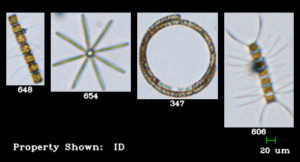
Biological oceanographers study the diversity, behavior, and distributions of marine organisms (from single-celled microbes to animals you can see with the naked eye), as well as their interactions with each other and the environment. All of these factors shape marine food webs, ocean health, and climate. Researchers at Skidaway Institute are experts in the study of microbial and plankton ecology, remote sensing, biogeochemistry, and environmental molecular biology. Using cutting-edge technologies and facilities, such as the Laboratory for Imaging Microbial Ecology (LIME), our research contributes to an improved understanding of factors that control the productivity and vitality of marine ecosystems, from local to global scales. Members of the biological oceanography group include:
Cohen Lab — Molecular ecology, physiology and functional diversity of marine microbes
Frischer Lab — Black gill disease in shrimp, zooplankton nutrition
Greer Lab — Zooplankton ecology
Rivero-Calle Lab — Bio-Optical and Satellite Oceanography
Savannah River Monitoring Program (SRiMP)


